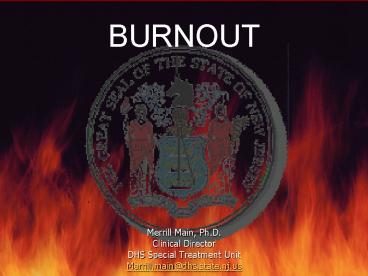Merrill Main, Ph.D. - PowerPoint PPT Presentation
1 / 20
Title:
Merrill Main, Ph.D.
Description:
Have, get, buy, borrow, or rent a life. Lack of self-care. Too much tendency to externalize. ... Stockholm Syndrome. YOU'RE THE WORST. I'll prove that I'm worthy. ... – PowerPoint PPT presentation
Number of Views:164
Avg rating:3.0/5.0
Title: Merrill Main, Ph.D.
1
BURNOUT
- Merrill Main, Ph.D.
- Clinical Director
- DHS Special Treatment Unit
- Merrill.main_at_dhs.state.nj.us
2
INTERNAL
- Have, get, buy, borrow, or rent a life.
- Lack of self-care.
- Too much tendency to externalize.
- Unmanaged general mental health issues.
- Savior complex gone wrong.
- Poor affect management.
3
EXTERNAL
- ?
- Answers in Organizational Psychology. For
example, Herzberg's Motivation-Hygiene Theory ?
4
EXTERNAL
- Lack of training
- Unclear expectations
- Lack of support
- Lack of resources
- Overutilization
- Underutilization
5
NUMBERS
- 20 to 25 show clinical burnout
- Kadambi and Truscott, 2003
- 30 of the teachers
- Rudow, 1999
- 50 of medical residents
- Martini, S., Arfken, C., Churchill A., and Balon,
R. (2004)
6
Sexual Offending Is it contagious?
- Were all sexual offenders once sexual victims?
- Will all victims become offenders?
- Do we begin to behave like the population that we
work with.
7
PARALLEL PROCESS
- Psychoanalytic idea that relationship between
patient and therapist is reflected in
relationship between therapist and supervisor. - Searles (1955)
- See the world through the patients eyes too
often and it may become habitual.
8
SYMPTOMS
- Vicarious Tramatization
- Hypervigilence
- Distrust
- Sexualization
- Objectification of patients
- Over-identification with patients
- Stress
- Exhaustion
- Depression
- Detachment from work
- Over-investment in work
9
OVER-IDENTIFICATION
10
YOURE THE BEST
- The high-school kid striving to be popular is
still alive inside all of us. - Savior complex.
- Misguided striving for personal safety.
- Stockholm Syndrome.
11
YOURE THE WORST
- Ill prove that Im worthy.
- The beatings will continue until morale improves.
- Effort justification
- We like most what weve struggled to master
12
Divisive
- Build one faction up, tear another down
- Shop for the best answer
- Play one against the other
- Highly attuned to existing differences/conflicts
- Magnify and exacerbate real differences
- Between individuals
- Between groups
- Instigate conflict for personal pleasure or gain
13
Manipulative
- Starts with small things
- Favors given or taken
- I wont tell
- Progresses to big things
- May seem reasonable at each step
- Often starts with small quid-pro-quo
14
UNDER-IDENTIFICATION
- Beyond gallows humor
- Distain
- Distrust
- Disregard
- Disrespect
15
THERAPIST STYLE
- Among the influential therapist behaviors, the
most important appear to be empathy, warmth,
rewardingnes, and directiveness. - Marshall (2005)
16
Effects and problems of working with sexual
offenders
- Excessive identification with offenders.
- Excessive anger toward of offenders.
- Parallel processes.
- Effect on clinicians sexual functioning.
- Work intruding into life.
- Become used to talking about sex with patients.
17
ANTI-BURNOUT
- Engagement
- Vigor
- Person-Environment Fit
18
Burnout Prevention
- Communicate with colleagues
- Commiserate with colleagues
- Utilize supervision
- HAVE A LIFE OUTSIDE OF WORK
- Dont worry more about patients problems than
they do.
19
REFERENCES
- Drapeau, M. (2005) Research on the Processes
Involved in Treating Sexual Offenders. Sexual
Abuse A Journal of Research and Treatment. 17,
117 - 125. - Edmunds, S. (Ed.) 1997. Impact Working with
Sexual Abusers. Safer Society Brandon, Vt. - Ennis, L. and Home, S., (2003). Predicting
Psychological Distress in Sex Offender
Therapists. Sexual Abuse A Journal of Research
and Treatment. 15, 149 - 157. - Farrenkopf, T. (1992) What Happens to Therapists
who work with Sex Offenders? Journal of Offender
Rehabilitation. 18(3/4), 217-223. - Kadambi, M., and Truscott, D., (2003) Vicarious
Traumatization and Burnout Among Therapists
Working with Sex Offenders. Traumatology. 9(4)
216-230. - Lea, S., Auburn, T., and Kibblewhite, K. (1999).
Working with Sex Offenders The Perceptions and
Experiences of Professionals and
Paraprofessionals. International Journal of
Offender Therapy and Comparative Criminology.
43(1), 103-119. - Little, L. and Hamby, S. (2001). Memory of
Childhood Sexual Abuse Among Clinicians
Characteristics, Outcomes, and Current Therapy
Attitudes. Sexual Abuse A Journal of Research
and Treatment., 13, 233 - 248. - Moulden, H. and Firestone, P. (2007). Vicarious
Traumatization The Impact on Therapists Who Work
With Sexual Offenders. Trauma Violence Abuse. 8,
67-83. - Nelson, M., Herlihy, B., and Oescher, J. (2002) A
Survey of Counselor Attitudes Towards Sex
Offenders. J of Mental Health Counseling. 24(1),
51-67. - Salter, A. (2003) Staff Seductions. In
Predators Pedophiles, Rapists and Other Sex
Offenders. Basic BooksNew York.Shelby, R.,
Stoddart, R., and Taylor, K. (2001) Factors
Contributing to Levels of Burnout Among Sex
Offender Treatment Providers. Journal of
Interpersonal Violence. 16(11), 1205-1217. - Steed, L., and Bicknell, J. (2001). Trauma and
the Therapist The Experience of Therapists
Working with the Perpetrators of Sexual Abuse.
Australasian Journal of Disaster and Trauma
Studies. 2001(1). - Thorpe, G., Righthand, S., and Kubik, E. (2001).
Brief Report Dimensions of Burnout in
Professionals Working with Sex Offenders. Sexual
Abuse A Journal of Research and Treatmnet., 13,
197 - 203. - W.L. Marshall, W. (2005) Therapist Style in
Sexual Offender Treatment Influence on Indices
of Change. Sexual Abuse A Journal of Research
and Treatmnet., 17 109-116
20
BURNOUT
- Merrill.main_at_dhs.state.nj.us































